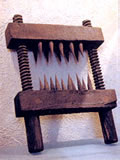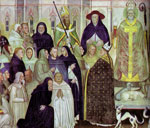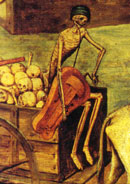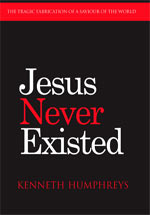Bringing the ungodly to Christ
"More numerous, than the legions "
The cohorts of salvation.
Papal appointments were extremely lucrative and for centuries were sold at auction.
The monkish orders, no less parasitic, were frequently founded anew, beginning with the ethics of an austere self-sacrifice ('the poverty of Christ'), and degenerating rapidly into a privileged and pampered fraternity living on the backs of the peasantry.
Thus the Benedictine Order (c. 515) was followed by the Cluniac (910), followed by the Carthusian (1084), followed by the Cistercian (1098), followed by the Franciscan (1210), followed by the Dominican (1216), followed by the Camelite (1220) – plus the military orders of 'Hospitallers' and 'Templars' (1120).
Intense rivalry existed between these 'corporations' for sinecures, patronage and gifts.
With perhaps half of Europe's manpower 'serving God' human progress came to a halt.
Slavery? – That will do nicely
Slaves should not desire their freedom – not according to the Bible. The Church never moved to abolish slavery, and indeed was itself a slave-owner.
"Art thou called being a servant? care not for it: but if thou mayest be made free, use it rather.
For he that is called in the Lord, being a servant, is the Lord's freeman: likewise also he that is called, being free, is Christ's servant."
–1 Corinthians 7:21,22
Hard Times
"In the new Empire of Diocletian and Constantine, slavery and poverty had greatly increased; life inside this Empire was harder than it had ever been before."
– Romer (Testament, p219)
Fashionable headwear for heretics
Bending the Knee
"That at the name of Jesus every knee should bow, of things in heaven, and things in earth, and things under the earth;
And that every tongue should confess that Jesus Christ is Lord, to the glory of God the Father."Philippians 2.9,11
Fashion accessory for heretics
The Gorgeous End of Law
"As the emperor's laws become weaker, the ceremony surrounding them becomes more baroque.
In the last days, the Divine One's edict is written in gold on purple paper, received with covered hands in the fashion of a priest handling sacred vessels, held aloft for adoration by the assembled throng, who prostrate themselves before the law – and then ignore it."
– T, Cahill (How the Irish Saved Civilization, p60)
Earth to earth, ashes to ashes, dust to dust
Early in the 1st century AD, Emperor Augustus established a Roman colony at Berytus (modern Beirut). Here he stationed two legions to keep an eye on a Greco-Semitic province which had sided with his old enemies Antony and Cleopatra. But he also commenced a lavish building program in the city. Two hundred years later, and having grown into a major port, Berytus was renowned for its school of Roman Law. The school had been founded in 200 AD by the Emperor Septimius Severus, a monarch who appreciated legal reasoning and nurtured its development. His marriage to the formidable Julia Domna had forged an imperial link to a prominent family of the nearby Syrian city of Emesa. Berytus was the first school of Roman Law in the eastern Empire and reached its apogee in the 3rd century with the professorship of its two most famous jurists (both natives of Phoenicia): Papinian (died 212) and Ulpian (died 228). Both served as imperial advisors. The Law School continued to furnish the eastern provinces of the empire with jurists and magistrates for three hundred years. The decline of the school – and of Law within the Roman Empire – went hand-in-hand with the rise of the Christian Church.
A Privileged Class of Priestly Parasites
Paganism had no need of leaders and Roman religion had no priestly class. Its priests (haruspices) were elected or co-opted from prominent citizens, laymen not 'experts', whose chief function was to propitiate the relevant gods to ensure continued good fortune. Belief did not really come into it; correctness of ceremony was paramount. Christianity introduced structure into religion. Indeed it offered a way to wealth and career outside of the only real alternative – the army.
But in 321 Constantine went further and began the process by which the clergy were exempted from the jurisdiction of civil law and the decisions of bishops became binding on civil magistrates.
An End to Justice The foolish Constantine was perhaps the first of a thousand monarchs who "too easily believed that he should purchase the favour of Heaven if he maintained the idle at the expense of the industrious." (Gibbon) In 438 Theodosius II began the process of Christianising the Law Code. Now, in Law, the imperial palace – even its stables! – became 'sacred.' The interweaving of the 'sacred person' of the monarch with the 'sacred Church of Christ' became ever tighter. The code spoke of "the thousand terrors that defend the boundless claim to honour of the Church." (Freeman, p259) A century later, Justinian, forever credited with his law code (indeed, the very spelling of 'justice'), actually did no more than authorise a compendium of the massive corpus of laws framed by his pagan predecessors (he employed the pagan Tribonian, in 529, to do the work). The 3rd century works of Papinian and Ulpian alone comprise more than one third of the 6th century compilation (Corpus Juris Civilis). His over-riding goal was to eliminate from Roman law any aspects which were incompatible with Christian theology. When the 'Digest' and the 'Pandects' were ready in 535, three million 'verses' had been reduced to 150,000. Notoriously, the Justinian Codex contained two pernicious statutes (Codex I., xi. 9 and 10) which decreed the total destruction of Hellenism, even in the civil life. These particular laws were vigorously enforced, with severe persecutions even of men in high positions. For its contribution, the 'pious, prosperous, renowned, victorious, and triumphant' Justinian gave the city of Berytus an honoury title: 'Nutrix Legum' – 'Mother of Laws.' The old gods must have heard: The once glorious city of Berytus was destroyed by a triple catastrophe of earthquake, tidal wave and fire in 551 AD.
Total A theocratic state is a particularly pernicious and austere form of dictatorship. Individual "sin" is held to pollute the community and is used to enforce a harsh, collective discipline. A blind obedience is required to secure God's blessing. Where once humanity had gathered in the agora to hear and debate through the skills of rhetoric and logic, now cowed 'sheep' knelt in silence in the basilica of a church to receive, without question, a sermon from on high. From the pulpit, too, came imperial propaganda, and on occasions, 'heretical' diatribes. In time, the call would be for holy murder – crusades, pogroms, witch hunts. In the fusion of Church with State, the imperial family (and indeed the barbarian successor kings) did indeed gain the "endorsement of Heaven." With a theocratic monarchy in the east, a papal monarchy in Rome, and barbarous sister kingdoms of christendom in the west, an ecclesiastic totalitarianism reigned throughout Europe, its tyranny permeating every sphere of life. Faced
with such almighty autocracy the ancient liberties of the common
people, if only ever slightly referenced by tribunes and assemblies,
dissolved before the 'divine right of kings' and 'Privilegia
Ecclesiastica'.
The study of jurisprudence, the very Law itself, became an irrelevance.
End
of Human Rights, New Forms of Oppression
Popular culture ensures that we are all more familiar with the slavery of ancient Rome than we are with the so-called "serfdom" of the Christian centuries which followed. Yet the empire of Rome, until the decline of the 4th century, encouraged and facilitated the manumission of slavery into freedom on a vast scale, and with it the growth of a large and important class of free or freed men. Nor did social mobility end merely with a former slave gaining his freedom. Many slaves are known to history because they became successful, wealthy and even powerful men in their own right, some themselves becoming slave-owners in turn. Former slaves became freedmen holding important positions in the state bureaucracy. The children of slaves could, and did, become powerful "Romans" – up to and including Emperor of all the Romans. Diocletian – one of the greatest of the Roman emperors, who ruled for thirty years and then retired – had parents who were born slaves. In the Christian monarchy that began with Constantine slavery was extended and made harsher. Instead of manumission the new hereditary employments of labourers and peasants created a 'serfdom' worse than slavery. Women, in particular, were singled out for subjugation and punishment. With the example of the blessed, ever-pure Virgin Mary set before them at every turn all non-virgins were pronounced whores and Jezebels. In time the sentence on women, so misogynously voiced by Tertullian, would lead to enforced celibacy, joyless marriage and witch burning.
Sources:
Copyright © 2004
by Kenneth Humphreys.
|
|||||||||||||||||||||||||||||||||||||||||||||||||||







